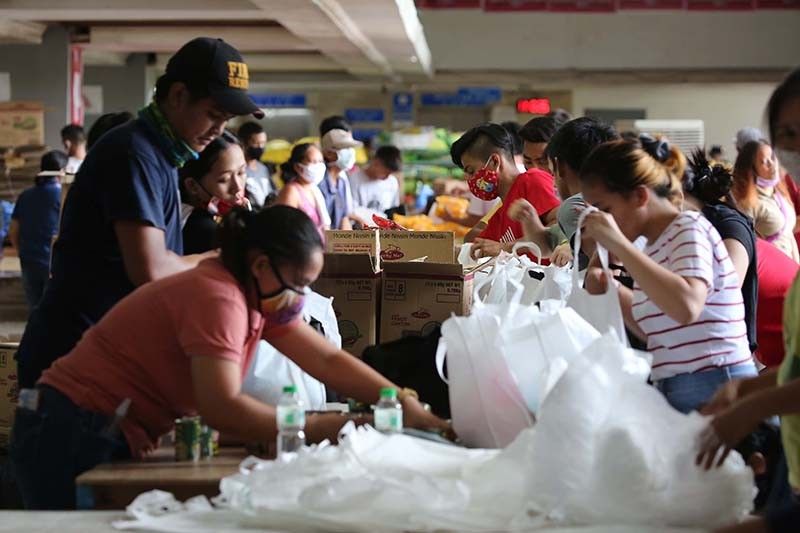Commentary: Public-private collaboration is key to recovery

There were mixed reactions when Pulse Asia released its Ulat ng Bayan survey results back in October. The nationwide survey found that amidst the continuing COVID-19 pandemic in the country, 91% of Filipinos trusted and approved of the performance of President Rodrigo Duterte.
Given the country's high number of cases and the government's slow response, critics questioned the results. They asked how, in the middle of a pandemic and the country's worst economic slump in decades, has the president's rating not only remained high but even increased since the last time Pulse Asia conducted this survey?
On the other hand, the president's allies, especially those in Malacañang, hailed the latest approval and trust scores. Presidential spokesperson Harry Roque said that these results were proof that the president was doing a good job responding to the pandemic and used the results to re-enforce the president's promise to do everything to rise from the pandemic.
More recently, the 91-percent approval and trust ratings cropped up again when Roque used it to defend the president's lewd remarks and behavior.
Critics of the president may argue the technicalities of how Pulse Asia conducted the surveys or how they arrived at these numbers. But as the president's supporters have shown, there is no arguing that these numbers have a hand in shaping government action, public policy direction and public opinion.
With this in mind, the findings of Pulse Asia's survey questions on public-private partnerships are all the more interesting.
Commissioned by Stratbase ADR Institute, Pulse Asia asked the same group of respondents who gave the president a 91-percent approval and trust rating if they believed that the government should engage in partnership with qualified and reputable private companies for the country's COVID-19 recovery.
The survey found that a huge majority, or 85%, of Filipinos believe that the country's recovery would entail a partnership between the government and the private sector.
This opinion was echoed by most Filipinos across geographic areas and socio-economic classes (79% to 93% and 79% to 91%, respectively). Ambivalence was expressed by 14% of Filipinos, while a contrary opinion was articulated by only 1%.
In the same survey, respondents were also asked what issues private investors can help address. The results showed that nine out of every 10 Filipinos (90%) said that private investors could help create jobs in the country. Meanwhile, sizeable majorities say private investors can help expand livelihood opportunities (68%) and alleviate poverty (62%).
2020 has been chock-full of examples of how the private sector is a reliable government partner in the country's recovery.
During the chaotic first few months of the pandemic, when the government was still slowly putting together its initial response, the private sector rallied its resources and efforts to help health workers and daily wage earners cope with the public health and economic effects of the pandemic.
Multi-sectoral initiatives such as Project Ugnayan sprang into action and with the support of the country's most prominent business groups, raised over a billion pesos to provide over a million low-income households with food vouchers that they could use at their local grocery stores.
When the country needed more quarantine facilities to isolate COVID-positive patients and stop transmission to family members and neighbors, private enterprises like the MVP Group, Filinvest Development Corporation, Razon Group, San Miguel Corporation and Ayala Group worked with the government to convert and build mega quarantine facilities.
Back when the country was desperately in need of more COVID-19 testing, the public-private Task Force T3 (Test, Trace and Treat) was set up. This initiative brought together the Asian Development Bank, the Philippine Disaster Resilience Foundation, the Philippine National Red Cross, and private sector participants: AC Health/Qualimed, Unilab and the MPIC Hospital Groups to swiftly expand testing capacity.
Even more recently, the private sector's role was again demonstrated when the government, in coordination with PLDT SMART and Globe, issued text-message emergency advisories for Typhoon Ulysses.
In its aftermath, Globe also deployed Dyip Sagip: Libreng Tawag, Libreng Charging and Libreng Wifi in typhoon-hit areas and committed to install more as needed. Globe also conducted relief efforts in partnership with Ayala Foundation.
The Ayala Group distributed over 5,000 relief packs for 25,000 individuals in affected areas. Smart Communications, too, gave free load to affected customers in Isabela and Cagayan and free calling and charging stations in typhoon-hit areas in Luzon.
Suppose these efforts are not enough to show government that the private sector is not a political enemy but rather a reliable partner in its COVID-19 recovery.
In this case, they need not look further than their celebrated surveys. If the government will turn to the president's 91-percent trust and approval score to rebut every critic and affirm every controversial action and decision, then it must also listen to the 85% of Filipinos that call on the government to work with and not attack, the private sector, for the country to rise from the pandemic.
Paco Pangalangan is the executive director of think tank Stratbase ADR Institute.
- Latest

























